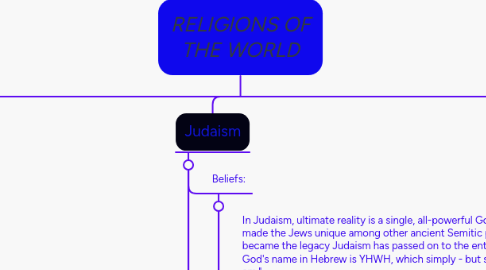
1. Christianity
1.1. Beliefs:
1.1.1. There is one God, eternally existent in three persons: God the Father, God the Son, and God the Holy Spirit.
1.1.2. The Bible is the only inspired, infallible, and authoritative written Word of God, penned by man with the leading of the Holy Spirit.
1.1.3. The blessed hope in the rapture of the Church at Christ's coming. The Church is all who believe in Jesus as their Savior.
1.2. Leaders:
1.2.1. Jesus
1.3. Religious Holidays:
1.3.1. Christmas: The day Jesus was born.
1.3.2. Easter: The day Jesus rose from the dead.
1.4. Customs:
1.4.1. Prayer
1.4.2. Worship
1.4.3. Sainthood
1.5. Place of Worship:
1.5.1. Church
1.5.2. Home
2. Buddhism
2.1. Beliefs
2.1.1. Buddhism believes that our external situation is created by our internal minds. This is equally true for our health and the state of our bodies. Many Buddhists use meditation, mantras, and prayers alongside medicines to help heal themselves.
2.1.2. Buddhism maintains that it is not up to others to make us meditate or study. We are responsible for creating our own suffering, and it is solely up to us to create the circumstances for our release. It requires personal wisdom and commitment.
2.1.3. The Buddha said it was more important to take steps to end your suffering than to follow endless discussions on the ‘true’ nature of God (and other such unanswerable questions).
2.2. Leaders
2.2.1. Buddha
2.3. Religious Holidays
2.3.1. Vesak
2.3.2. Buddhas Birthday
2.3.3. Kathina Ceremony
2.4. Customs
2.4.1. Worship, in Buddhism, can take place at a temple or at home before a set-up shrine. It can occur in the presence of a monk, in a group, or alone. In Buddhism, worship involves a mantra, a syllable, word, or prayer, which is spoken or displayed on a prayer wheel.
2.4.2. The sacred mandala is a visual of the universe that is painted, imagined, or created with colored sands. A mandala is used to help Buddhists reach Enlightenment.
2.4.3. There are different ways to honor Buddha such as by offering gifts to Buddhist monks or to fellow Buddhists, going on pilgrimages, or becoming ordained as a Buddhist monk. Chanting is considered another form of devotion. In Mahayana Buddhism, one can choose the path of a bodhisattva, or "enlightened one," as the ultimate form of devotion. Accepting the Three Jewels is part of Buddhist devotion. The Three Jewels include the Buddha, the Dharma, and the Sangha, which is anyone who is a monastic practitioner or has attained to any one of the Four stages of enlightenment.
3. Judaism
3.1. Beliefs:
3.1.1. In Judaism, ultimate reality is a single, all-powerful God. It is this belief that made the Jews unique among other ancient Semitic peoples and that became the legacy Judaism has passed on to the entire Western world. God's name in Hebrew is YHWH, which simply - but significantly - means "I am."
3.1.2. That it is only proper to pray to God, and no other.Judaism does not believe in praying through intermediaries, a belief that is popular in other religions.
3.1.3. Orthodox Judaism believes that the Torah is not complete without the oral part of the Torah that Hashem verbally spoke to Moses to explain the written Torah. Believing in the written torah without believing in Torah Shebaal Peh is considered Apikorsus (heresy) according to orthodox beliefs of Judaism. The Torah Shebaal Peh is written in many volumes of the Talmud.
3.2. Leader:
3.2.1. Abraham
3.2.2. Moses
3.3. Religious Holidays:
3.3.1. Hanukkah
3.3.2. Sukkot
3.4. Customs:
3.4.1. Not naming a child a living person
3.4.2. Praying in Hebrew
3.4.3. Wearing a head covering during prayer.
4. Islam
4.1. Beliefs:
4.1.1. According to the Quran, Allah "created man from a clot of blood" at the same time he created the jinn from fire. Humans are the greatest of all creatures, created with free will for the purpose of obeying and serving God.
4.1.2. Like Christianity, Islam teaches the continued existence of the soul and a transformed physical existence after death. There will be a day of judgment and humanity will be divided between the eternal destinations of Paradise and Hell.
4.1.3. The single most important belief in Islam, and arguably the central theme of Islam, is that there is only one God. The name of God is Allah, which is simply Arabic for "the (al) God (Ilah)." The term is related to Elohim, the Hebrew word for God.
4.2. Leaders:
4.2.1. Muhammad
4.3. Customs:
4.3.1. Reciting 'Adhaan' in the Right Ear of a Newly Born
4.3.2. Using the Right Hand for Eating & Drinking
4.3.3. Pronouncing God's Name Before Eating or Drinking

